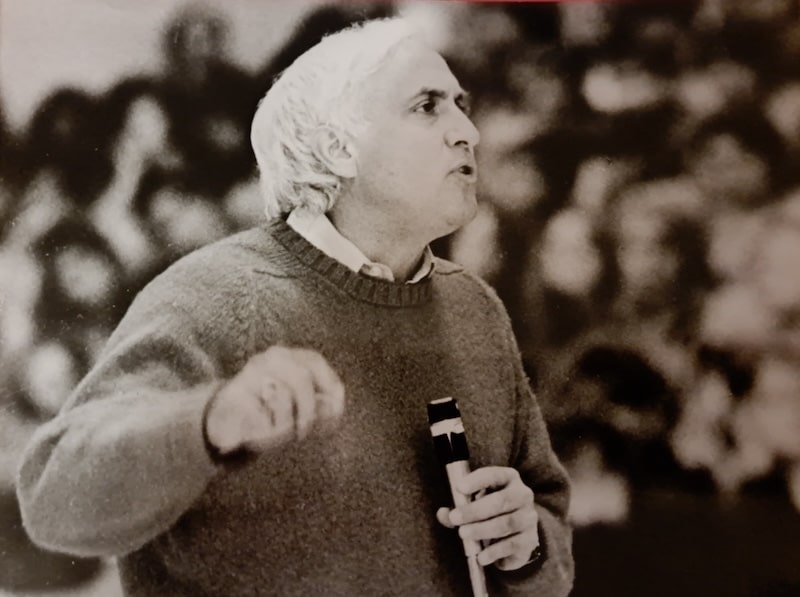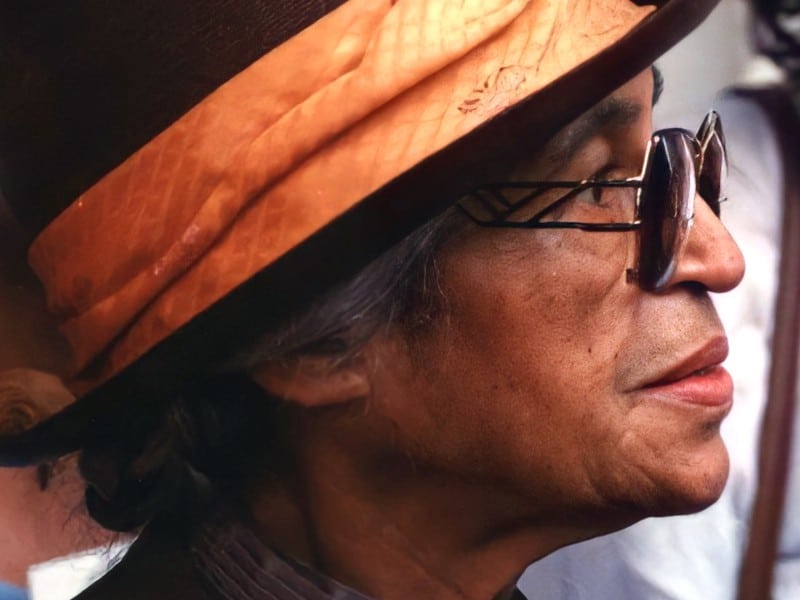Partner Partner Content This nonprofit coalition is leveling up public understanding of Detroit’s water infrastructure
"Everyone can learn and everyone can play a role in the future," says Nicole Brown, a senior program manager for Detroit Future City, and leader of the Land + Water WORKS Coalition. "It has to be all hands on deck to move the needle further."
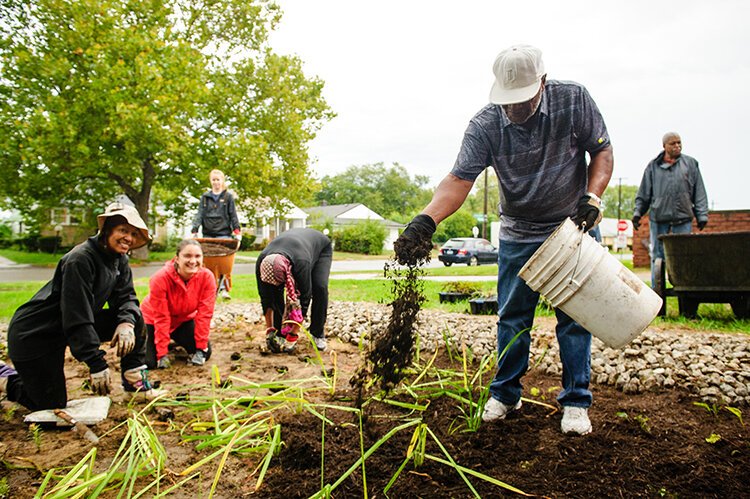
This story is part of the series Exploring Economic Equity, supported and directed by Detroit Future City.This Model D and Metromode series aims to report everyday Detroiters and their experiences as they live their lives and make choices about their neighborhoods, health, education, jobs, transportation, and other factors related to economic equity. All content in this series is created in partnership with Detroit Future City.
A little over four years ago, local conservationist Lisa Rodriguez was deeply intrigued when she heard that Detroit Future City (DFC), a nonprofit think-and-do tank, had joined forces with nine other local nonprofits (The Alliance for the Great Lakes, Eastside Community Network, Ecoworks, The Greening of Detroit, Friends of the Rouge, Keep Growing Detroit, Michigan Interfaith Power and Light, Southwest Detroit Environmental Vision, and The Sierra Club) to serve as the backbone agency of a new initiative called the Land + Water WORKS Coalition (L+WW Coalition).
At the time, Rodriguez was the curator of parks and green spaces for Urban Neighborhood Initiatives (UNI), located in the Springwells community of Southwest Detroit. Rodriguez, who is now currently UNI’s community engagement coordinator, shares that she strongly resonated with the coalition’s mission of shifting the public’s understanding of the city’s water infrastructure in order to create a more equitable, sustainable, and resilient Detroit for future generations.
“I have a great love for the Detroit River and I’ve been really concerned about how it’s being polluted and if it’s going to be safe enough for this community to survive on within the next hundred years,” Rodriguez says. “When I heard that DFC was entering the conversation about our city’s water and would be helping to outline best practices, I needed to know more.”
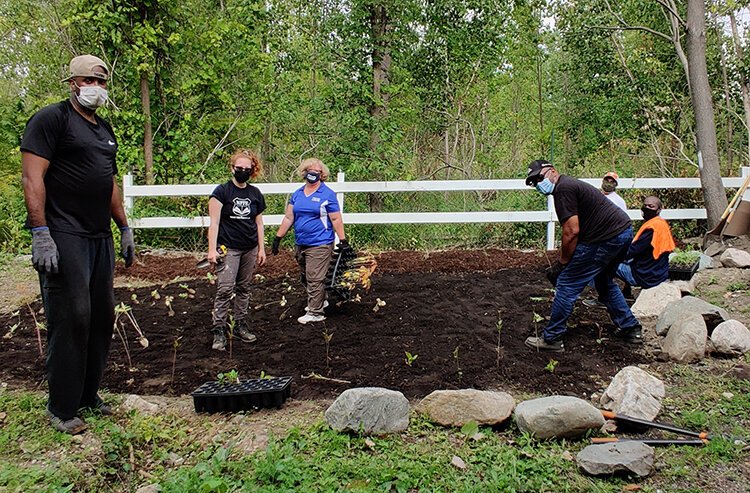
Creating Change and Changemakers
Since the beginning, the coalition has leveraged a triple-prong approach of research, education, and outreach, and technical assistance and advocacy. Some of their key efforts have included educating Detroiters about the Detroit Water and Sewerage Department (DWSD) drainage charge, green stormwater infrastructure (GSI), and the local combined sewer overflow (CSO) crisis. The organization’s recently released Land + Water WORKS Impact Report 2017-2021 boasts significant reach.
Some top-note facts from the 35-page report: from November 2018 to December 2020, the L+WW Coalition has engaged 41,583 Detroiters and property owners, they were instrumental in the installation of 11 rain gardens across Detroit’s seven city council districts, and they’ve planted projects that manage over 558,772 gallons of run-off annually.
“It’s been a tremendous journey,” says Nicole Brown, a senior program manager for DFC’s land use and sustainability department and the coalition’s leader. “All of our coalition partners and community partners came to the work with a variety of different perspectives and strengths, and we couldn’t have accomplished all we’ve done so far without them.”
The coalition worked relentlessly to first gain insight into how Detroiters — many of whom were then dealing with mass DWSD water shutoffs, and trying to understand the Flint water crisis and its generational impacts on primarily low-income Black and Brown communities — perceived their connection to the land, water, and water infrastructure. Through a series of community forums and conversations, an innovative curriculum (for both adults and youth) was then developed to help educate the public about why the coalition’s work was important.
Creating both change, and changemakers, was a paramount objective.
“We realized that our sweet spot had to be around educating people and getting them to understand what was going on and what the options were,” Brown says. “Detroiters were dealing with a lot and we wanted to demystify all the language around the health of our water and break down information on things, like the drainage charge, in ways that were really understandable.”
For Rodriguez, this is where she knew she could contribute to the L+WW Coalition’s vision. She signed on to become a part of their ambassador program, which teaches residents and nonprofits about the social, environmental, and economic benefits of GSI practices and land and water stewardship. Rodriguez is one of 77 ambassadors who, over nine months, underwent a 52-hour soft-skills and technical training program and then, in turn, shared their new skills and knowledge with their communities. To date, coalition ambassadors have impacted over 34,000 residents, nonprofits, small businesses, and faith-based organizations. Often, connections were diligently forged one person or one organization at a time.
“I went door-to-door after people had experienced months of flooding,” Rodriguez says. “The timing was right because a lot of people were really open to getting information on how they could mitigate flooding from their property.”
Whether she talked with people about how to read their water bill, understanding the DWSD charge and how to reduce it, rain barrel usage, CSO reduction, or how to disconnect their downspouts, Rodriguez was always confident that she was making a difference. She estimates that she’s personally connected with over 700 households in the Springwells community since she’s been part of “the L+WW Coalition family.”
Brown stresses that ambassadors like Rodriguez are an absolute cornerstone of the coalition’s work.
“What we’ve discovered is that on-the-ground, peer-to-peer conversations that ambassadors are able to have with friends, neighbors, and nonprofits that they interact with regularly within their day-to-day lives are really crucial toward creating a strong and resilient Detroit.”
Building a Better City through Collaboration
Resident ambassadors have gone well above and beyond just talking. Many were active in outdoor community outreach events such as birdhouse-building sessions, rain garden workshops, and demonstration plantings. Some were involved in the L+WW Coalition’s Connected to our Roots event series, all four of which are showcased in the L+WW Impact Report. Designed to share the message of land and water stewardship with stakeholders, each event was a shared effort between coalition ambassadors, several community partners and either the Sierra Club Michigan Chapter, Keep Growing Detroit or The Greening of Detroit.
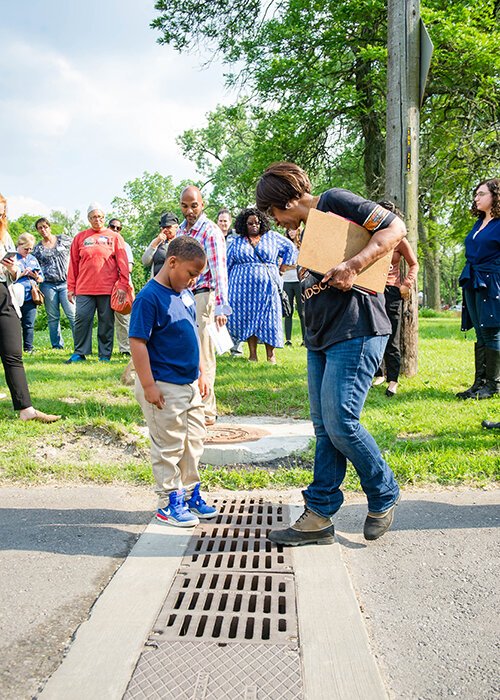
“The whole experience has been a wonderful success,” says Fai Foen, director of green infrastructure at The Greening of Detroit. “It’s always important for like-minded, and even non- like-minded organizations, to collaborate because that is where you are going to find the most ingenuity in tackling the issues that affect our city.”
Working with Rodriguez, and Wayne State University’s Center for Urban Responses to Environmental Stressors, Foen’s organization was the partner lead for a 2019 Connected to Our Roots event called What’s in Our Water. Held at Eliza Howell Park in District 1 with the support of coalition partners the Sierra Club Michigan chapter and Friends of the Rouge, 30 people attended the event, which featured a talk by Tracie Baker, an assistant professor at the Institute of Environmental Health Sciences and the Department of Pharmacology at Wayne State University (WSU). Following her talk on the evolving crisis of chemical substances and microplastics in Detroit’s waterways, participants took part in a resource fair that displayed the percentages of chemicals found in the Rouge River. The viewing of a unique art installation topped off the event.
“We released lighted paper lanterns into the water and each lantern represented a different pollutant found in the Rouge River,” Foen says. “There was live music, people brought their lunches and everyone was really paying attention.”
She adds that such experiences are important to a sustainable and equitable city.
“Personally, I didn’t have a science background until later in life, and it’s important to be able to talk about these important things that have an impact on our lives,” she says. “A big part of the coalition’s work, and The Greening of Detroit’s work, is about simplifying information that may seem very complicated so more people can become aware and then be motivated to take action.”
The Time is Now
Moving forward, mobilizing more Detroiters, property owners, advocates and practitioners, alongside the public and private sectors, will remain a focus for the L+WW Coalition. Brown shares that there is already a shift.
“We’re seeing the impact,” Brown says. “More people are attending events and planning sessions. More people are asking questions about what has now been made very real for them.”
There is still more work to be done and more people to reach, and to that end, a new L+WW website has been launched. Designed as a one-stop-shop for everything to do with land and water in Detroit, visitors can conveniently learn about GSI, CSOs, how to become a land and water steward, watch easy how-to videos, book an ambassador to speak at an event, or sign up for partner programs.
“Everyone can learn and everyone can play a role in the future,” Brown says. “It has to be all hands on deck to move the needle further.”
